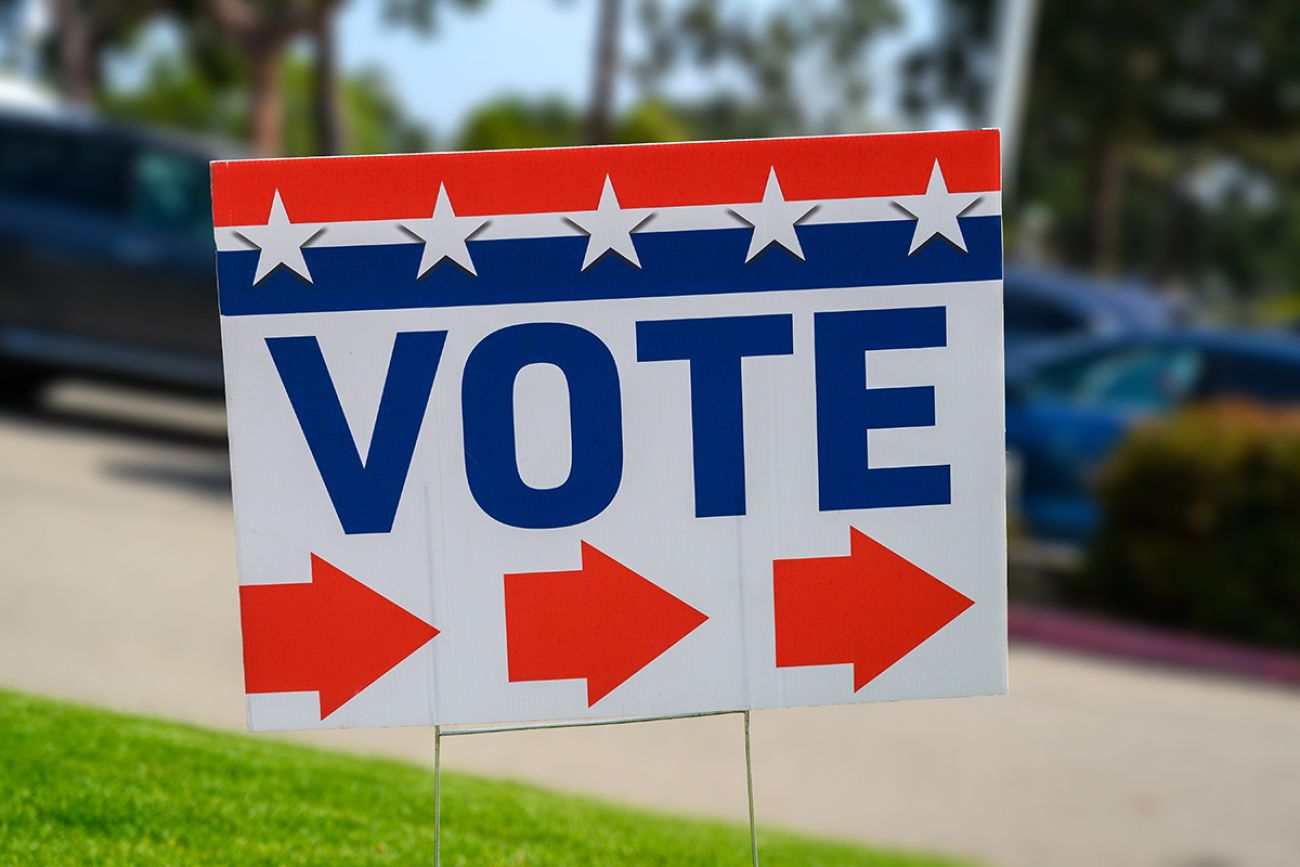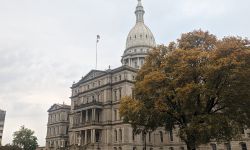Early voting a ‘significant new option’ for voters, ‘significant challenge’ for clerks


- Statewide in-person early voting in Michigan begins Saturday, running for eight hours a day ahead of Feb. 27 primary
- Early voting one of several major changes to election process taking effect in 2024 cycle after voter-approved ballot measures, legislative reforms
- Local clerks have struggled with some of the changes, including requirement to contact permanent absentee voters who haven’t selected which primary ballot they want
Of all the elections Lansing City Clerk Chris Swope has overseen in the last 18 years, preparations for the 2024 presidential primary cycle has made it “one of the craziest.”
Starting Saturday, Michigan voters will have the option to cast a ballot in person ahead of the Feb. 27 election, and have at least nine days of Election Day-style early voting in every subsequent statewide election. That’s in addition to a host of other changes to the state’s election process, brought on by a 2022 voter-approved ballot initiative and legislative reforms.
For the average voter, the changes may not seem seismic — early voting locations will operate similarly to Election Day polling places, and although voters can now opt in to permanent absentee voting and track their ballots electronically, the process for mailing in or dropping off a ballot is much the same.
Behind the scenes, ensuring the first test of an election overhaul goes off without a hitch has proved challenging for many of Michigan’s local clerks.
“We’re frankly just moving on a lot of different fronts,” Swope said. “This has been very stressful.”
Related:
- Michigan early voting starts Feb. 17. What to know about presidential primary
- What's new in Michigan 2024 election? Early voting, ballot tracking on list
- Who's on Michigan’s 2024 primary ballot? Trump, Biden have competition
The changes bring Michigan in line with 21 other states that offer in-person early voting and builds off of reforms passed by voters in 2018 that allowed every voter the option of casting an absentee ballot.
“As we transition from a state that has an Election Day into a state that has Election Days, plural…that is going to be a significant change and significant new option for our citizens and a significant new challenge for our clerks to meet,” Secretary of State Jocelyn Benson told Bridge Michigan.
Primary ballot woes
Leading up to the 2024 cycle, election officials have worried about the costs of implementing new requirements, hiring enough election workers to staff early voting polling locations and getting election software and ballot printing needs up to speed.
But the change clerks have been “losing sleep over” in recent weeks is a requirement passed out of the Democratic-majority Legislature regarding absentee voters who have chosen to vote by mail in every election moving forward. Michigan is now one of eight states that allows any voter to sign onto a permanent absentee ballot list, according to the National Conference of State Legislatures.
Michigan voters are not required to register with a specific political party to vote in primaries, but must choose which political party’s ballot they want in presidential primary elections. Legislation implementing permanent absentee voting requirements in Michigan required city and township clerks to call, text and email voters who hadn’t returned a selection form.
That amounted to “anguish and astronomical expense” by requiring tens of thousands of calls to registered voters who hadn’t selected a ballot, according to a Jan. 11 letter to Benson and Elections Director Jonathan Brater from a group of 74 municipal clerks and deputy clerks.
Lansing contracted out the work, Swope said, which cost $3,232.25 to contact about 4,000 voters. Other communities resorted to overtime charges for staff. Presidential primary costs at the local level are typically reimbursed by the state after the election is complete.
“That particular instance was made all the more challenging by the lack of flexibility in the legislation, which created more challenges than it had to for us to actually do what we needed to do,” Benson said.
Although her office worked with clerks who were struggling, that particular change was a legislative statute, meaning that there wasn’t much Benson or her staff could do. She said she’ll seek changes before the 2028 presidential primary to give more flexibility to clerks when it comes to contacting voters.
Sen. Ruth Johnson, a Holly Republican and former Secretary of State, contends Benson’s office could be doing more to assist clerks with the transition, be it through funneling more of the department’s budget down to local clerks or by taking on some of their administrative workload.
“She has the resources for contacting those voters and getting the information that’s legally required,” Johnson said. “They’re pleading for some more help.”
Early voting
The biggest change of the bunch is the rollout of early in-person voting. Clerks are now required to provide at least nine days of early voting for eight hours a day ahead of statewide elections, starting the second Saturday before an election until the Sunday before the election.
In-person early voting is slightly different from the no-reason absentee voting offered in recent election cycles. Although voters in recent cycles could request, fill out and file an absentee ballot in person ahead of Election Day, early voters this year will experience the voting booths, poll workers and “I Voted” stickers synonymous with Election Day.
The timeline to get early voting procedures correct ahead of the presidential primary has been “very, very tight” for election officials, particularly when it came to training the requisite number of workers and ensuring the process was secure, Ottawa County Clerk Justin Roebuck said during a recent press conference.
“As election officials, our priority number one is the accuracy and integrity of the system itself,” he said. “Sometimes, when you inject a lot of changes into a system, that can be really challenging.”
Despite the heavy lift, Roebuck said he’s “confident that we’re there” after weeks of training election workers and prepping for the shift. He views early voting as a good thing for election security and for boosting the confidence of voters who want to vote before Election Day, but also want to “actually watch the ballot go through.”
Several communities around the state conducted an early voting test run in local elections last fall, Benson said, adding that Michigan is “ready to go and fully staffed at every level” for the pending presidential primary.
Long-term effects
Longtime Michigan election observers acknowledged the new process would cause clerks some initial heartburn, but suggested the long-term benefits could outweigh the difficulties.
Chris Thomas, the state's former elections director who is currently assisting with the city of Detroit's election process, said the changes by and large bring Michigan in line with most other states and ease Election Day pressures on local officials.
The design of Michigan’s early voting process allows for collaboration between communities for in-person voters and pre-processing of absentee ballots, which Thomas predicted would take some of the day-of Election Day pressure off of clerks. As long as initial hiccups with permanent absentee voter notifications are addressed, the program will ultimately save clerks a lot of time and back-and-forth paperwork and allow voters already approved for absentee ballots to continue getting them without new applications every cycle.
“The first couple of elections are going to be a steeper slope, but that'll become part and parcel of the process,” Thomas said. “We now have the tools out there that most other states have, which puts us in a good position.”
In the interim, Johnson — who has concerns about the long-term impacts of Proposal 2 — suggested voters should “be nice to their clerk” as they adjust to Michigan’s new normal for voting.
“We've never had such changes in over 50 years of elections,” she said.
See what new members are saying about why they donated to Bridge Michigan:
- “In order for this information to be accurate and unbiased it must be underwritten by its readers, not by special interests.” - Larry S.
- “Not many other media sources report on the topics Bridge does.” - Susan B.
- “Your journalism is outstanding and rare these days.” - Mark S.
If you want to ensure the future of nonpartisan, nonprofit Michigan journalism, please become a member today. You, too, will be asked why you donated and maybe we'll feature your quote next time!


